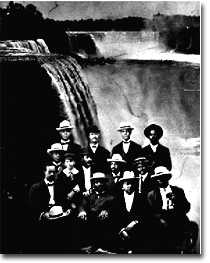42e. W. E. B. DuBois

Founding members of the Niagara Movement, formed to assert full rights and opportunity to African Americans. "We want full manhood suffrage and we want it now.... We are men! We want to be treated as men. And we shall win." W.E.B. DuBois is on the second row, second from the right.
William Edward Burghardt DuBois was very angry with Booker T. Washington. Although he admired Washington's intellect and accomplishments, he strongly opposed the position set forth by Washington in his Atlanta Exposition Address. He saw little future in agriculture as the nation rapidly industrialized. DuBois felt that renouncing the goal of complete integration and social equality, even in the short run, was counterproductive and exactly the opposite strategy from what best suited African Americans.
Early Life and Core Beliefs
The childhood of W. E. B. DuBois could not have been more different from that of Booker T. Washington. He was born in Massachusetts in 1868 as a free black. DuBois attended Fisk University and later became the first African American to receive a Ph. D. from Harvard. He secured a teaching job at Atlanta University, where he believed he learned a great deal about the African American experience in the South.
DuBois was a staunch proponent of a classical education and condemned Washington's suggestion that blacks focus only on vocational skills. Without an educated class of leadership, whatever gains were made by blacks could be stripped away by legal loopholes. He believed that every class of people in history had a "talented tenth." The downtrodden masses would rely on their guidance to improve their status in society.
Political and social equality must come first before blacks could hope to have their fair share of the economic pie. He vociferously attacked the Jim Crow laws and practices that inhibited black suffrage. In 1903, he published The Souls of Black Folk, a series of essays assailing Washington's strategy of accommodation.
The Niagra Movement and the NAACP
In 1905, DuBois met with a group of 30 men at Niagara Falls, Canada. They drafted a series of demands essentially calling for an immediate end to all forms of discrimination. The Niagara Movement was denounced as radical by most whites at the time. Educated African Americans, however, supported the resolutions.
Four years later, members of the Niagara Movement formed the National Association for the Advancement of Colored People (NAACP). This organization sought to fight for equality on the national front. It also intended to improve the self-image of African Americans. After centuries of slavery and decades of second-class status, DuBois and others believed that many African Americans had come to accept their position in American society.
DuBois became the editor of the organization's periodical called The Crisis, a job he performed for 20 years. The Crisis contained the expected political essays, but also poems and stories glorifying African American culture and accomplishments. Later, DuBois was invited to attend the organizational meeting for the United Nations in 1946.
As time passed, DuBois began to lose hope that African Americans would ever see full equality in the United States. In 1961, he moved to Ghana. He died at the age of 96 just before Martin Luther King Jr. led the historical civil rights march on Washington.






